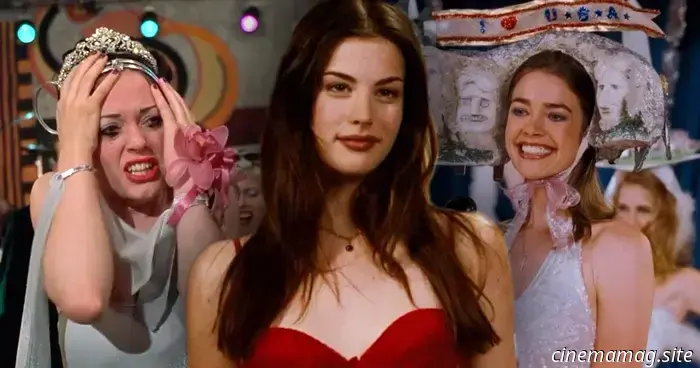
Cannes Review: The Chronology of Water Marks Kristen Stewart's Essential Introduction to Her Directorial Brilliance
Book adaptations result in two types of films: those that transliterate and those that translate. The former strive to maintain the essence of the source material, often leading to a rendition that is so faithful it appears as a direct transfer from page to screen. In contrast, the latter fully engage with both mediums, creating a poetic space between the book and the film, similar to translating an expression from one language to another. Adapting a work can be a daunting task for even seasoned filmmakers, and it is particularly challenging for newcomers. This challenge intensifies for an A-list actress making her directorial debut, who is likely to face significant scrutiny. In this context, Kristen Stewart’s choice to adapt Lidia Yuknavitch’s 2011 memoir, The Chronology of Water—an author who is notably recognized for her second book, The Small Backs of Children—indicates that the alignment between the artist and the material was intentional and not coincidental.
Yuknavitch’s writing is powerful, ebbing and flowing with each emotional encounter she recounts: from her experiences as a young girl and competitive swimmer in the locker room to the various men and women who have impacted her life in different ways, her personal narrative infuses the book with a sense of unpredictability. The Chronology of Water epitomizes a writer’s memoir, filled with wonder and revulsion, driven by the compulsion to create—what arises when one must create. This impressionistic storytelling presents difficulties in adapting The Chronology of Water without oversimplifying the complex relationship between art and the body that motivates Yuknavitch’s narrative. However, Stewart understands that if a suitable form does not exist for a story, it must be developed.
This realization is perhaps the most enlightening aspect of the film: Yuknavitch’s inspiration is palpable, and Stewart’s approach is resolute. The Chronology of Water remains remarkably true to its original text, expanding the five-act structure and first-person perspective into a richly textured 16mm film haven where every narrated moment is preserved indefinitely. Cinematographer Corey C. Waters, in his largest project to date, often employs extreme close-ups in static shots, intercutting them to portray Lidia’s (Imogen Poots) body in fragments, reflecting her self-denial of wholeness. A montage of significant images appears at the film’s outset—blood swirling down the drain, pebbles placed on baby clothes, a pregnant woman’s belly—as these large close-ups dominate the screen in their textured quality; crackling sounds and brief silences create space for an ambient score that immerses itself in the visuals. This is subjective cinema at its finest.
Stewart allows scenes to extend in other, more structured sections, providing viewers with a more comprehensive view of Lidia’s life from her perspective: the oppressive family dynamic, swimming, reckless college experiences, substance abuse, swimming, relationships, encounters with men and women, swimming, grief, being a mother to a stillborn child, and swimming. Through her adaptation, Stewart exhibits a profound understanding of rhythm both within and between scenes, infused with an experimental quality reminiscent of Maya Deren—especially evident in the earlier segments and whenever Lidia’s past resurfaces in flashbacks or recollections. One can almost sense the stale air of the Yuknavitch family home permeating the orange and yellow tones of these shots.
"Flowing" might be the term that best encapsulates The Chronology of Water, but not merely in an abstract sense. Kristen Stewart successfully translates the flow of words into images and sound, creating a filmmaking style that is fluid and determined, akin to a river that gains strength as it encounters obstacles. Dynamism and movement are what define cinema as an art form, and while this may be an obvious observation, it requires both skill and discipline to align form with content so seamlessly, at such a fundamental level. Yuknavitch’s memoir reflects both pain and joy, showcasing the resilience of a woman’s body; Stewart’s filmmaking renders these experiences not overtly visible or audible, but convincingly felt.
The Chronology of Water had its premiere at the 2025 Cannes Film Festival.

Other articles

 The Top Movies of the 2025 Cannes Film Festival
The 78th Cannes Film Festival has officially wrapped up, with Jafar Panahi's It Was Just an Accident winning the Palme d'Or (you can find all the jury winners here). Our coverage will persist with additional reviews this week—and well into the future as we offer updates on the developments of these selections—we've reached out to our
The Top Movies of the 2025 Cannes Film Festival
The 78th Cannes Film Festival has officially wrapped up, with Jafar Panahi's It Was Just an Accident winning the Palme d'Or (you can find all the jury winners here). Our coverage will persist with additional reviews this week—and well into the future as we offer updates on the developments of these selections—we've reached out to our
-4K-Ultra-HD-Review.jpg) Black Bag (2025) - Review in 4K Ultra HD
Black Bag, 2025. Directed by Steven Soderbergh. Featuring Cate Blanchett, Michael Fassbender, Marisa Abela, Tom Burke, Naomie Harris, Regé-Jean Page, Pierce Brosnan, and Gustaf Skarsgård. SYNOPSIS: Steven Soderbergh's newest film, Black Bag, is released on 4K Ultra HD along with a Blu-ray disc and a digital copy code. This is a clever, brisk little […]
Black Bag (2025) - Review in 4K Ultra HD
Black Bag, 2025. Directed by Steven Soderbergh. Featuring Cate Blanchett, Michael Fassbender, Marisa Abela, Tom Burke, Naomie Harris, Regé-Jean Page, Pierce Brosnan, and Gustaf Skarsgård. SYNOPSIS: Steven Soderbergh's newest film, Black Bag, is released on 4K Ultra HD along with a Blu-ray disc and a digital copy code. This is a clever, brisk little […]
 12 Notable Movie Star Feuds That Were Quite Ugly
Here are 12 feuds between movie stars that intensified rapidly. While some have reconciled, others are unlikely to do so.
12 Notable Movie Star Feuds That Were Quite Ugly
Here are 12 feuds between movie stars that intensified rapidly. While some have reconciled, others are unlikely to do so.
 ThunderCats: Lost #3 - Comic Book Teaser
Dynamite Entertainment will publish ThunderCats: Lost #3 this Wednesday, and you can check out an exclusive preview of the issue below… As Captain Shiner's oppressive mercenaries, headed by the unyielding bounty hunter Scorpius, close in on their location, the Lost team is faced with the need to take another risk to return to the […]
ThunderCats: Lost #3 - Comic Book Teaser
Dynamite Entertainment will publish ThunderCats: Lost #3 this Wednesday, and you can check out an exclusive preview of the issue below… As Captain Shiner's oppressive mercenaries, headed by the unyielding bounty hunter Scorpius, close in on their location, the Lost team is faced with the need to take another risk to return to the […]
 7 Incredible 90s Teen Films You Might Have Overlooked
Casey Chong lists seven overlooked teen films from the 1990s. This decade featured a wide array of teen movies that spanned various genres, including comedies, horrors, and thrillers. While hits like Clueless, American Pie, and Scream achieved commercial success and became classics in their genres, many other teen films failed to gain attention and appreciation during their release. [...]
7 Incredible 90s Teen Films You Might Have Overlooked
Casey Chong lists seven overlooked teen films from the 1990s. This decade featured a wide array of teen movies that spanned various genres, including comedies, horrors, and thrillers. While hits like Clueless, American Pie, and Scream achieved commercial success and became classics in their genres, many other teen films failed to gain attention and appreciation during their release. [...]
Cannes Review: The Chronology of Water Marks Kristen Stewart's Essential Introduction to Her Directorial Brilliance
Book adaptations produce two types of films: those that transliterate and those that translate. The former prioritize maintaining the essence of the original material, often resulting in a portrayal that is so faithful it appears rigid, resembling a direct transfer from the page to the screen. In contrast, the latter fully embrace both forms of media, permitting for
